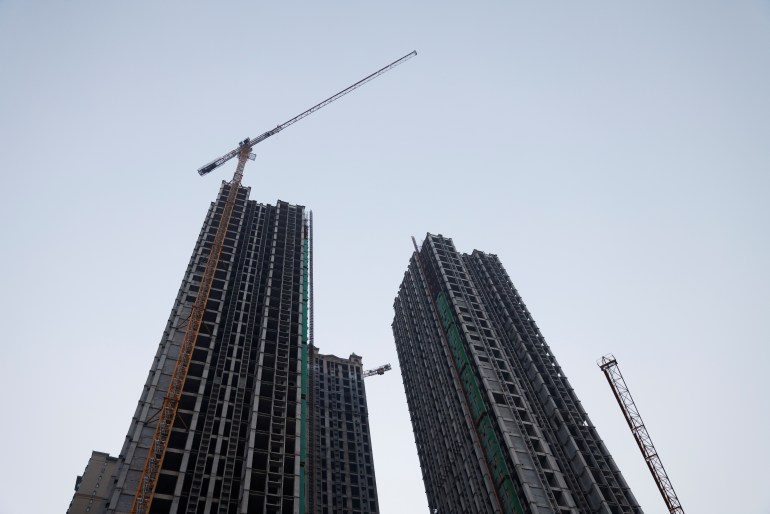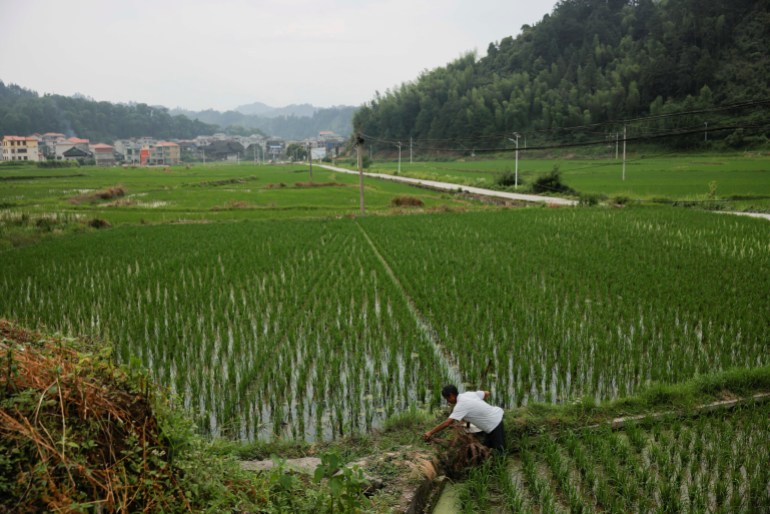China’s cash-strapped native governments can’t pay staff on time | Enterprise and Economic system
[ad_1]
Hu Mingdan, a civil servant in jap China, prided herself on touchdown a job often known as an “iron rice bowl” – the sort the place you don’t fear about being laid off or chasing fee.
That’s till late final yr when, for the primary time in additional than 10 years of working as an accountant for the native authorities, Hu’s paycheck was delayed for 3 months.
“Lots of my colleagues’ salaries had been delayed, and it was exhausting as a result of now we have households to feed,” Hu, who lives and works in Nanchang, Jiangxi province, informed Al Jazeera. “This was unimaginable earlier than.”
Hu’s delayed wages are a symptom of a deeper malaise within the funds of native governments in China.
Internationally’s second-largest economic system, cash-strapped provincial and native governments are auctioning off public colleges, chopping again on contracts with personal contractors, and slashing pensions.
Regardless of China’s better-than-expected financial progress of 4 % within the first quarter of 2023, many subnational authorities are deeply mired in debt, posing a problem to the nation’s restoration from COVID-19 and practically three years of robust pandemic curbs.
Final month, Guizhou, one among China’s poorest provinces positioned within the nation’s mountainous southwest, appealed to Beijing for a possible bail-out to keep away from defaulting on its debt.
The Centre for Improvement Analysis, a analysis centre affiliated with the provincial authorities, stated Guizhou’s ranges of debt had turn out to be a “vital and pressing concern” and turn out to be “unusually tough” to repay.
The Guizhou authorities didn’t reply to Al Jazeera’s request for remark.

Guizhou just isn’t alone in being within the crimson.
In 2022, every one among China’s 31 provinces and municipalities, aside from Shanghai, reported fiscal deficits, based on the Nationwide Bureau of Statistics.
Extreme spending on “zero-Covid”-related insurance policies and the downturn in the true property market have contributed considerably to native governments’ monetary woes, based on analysts.
“The federal government was counting on fast GDP progress and hovering land costs to service its debt,” Cheng Juelu, a Shanghai-based economist and skilled on China’s native authorities debt, informed Al Jazeera. “Nevertheless, the pandemic and the true property market state of affairs have turned these assumptions on their head.”
China’s “zero-Covid” technique, which prioritised stamping out coronavirus instances at nearly any value, positioned a extreme pressure on native authorities’ funds.
Many Chinese language municipalities are nonetheless feeling the price of lockdowns, mass PCR testing, and centralised quarantine, which required appreciable sources when it comes to cash and manpower along with inflicting extreme disruption to the economic system.
Guangdong, Zhejiang and Beijing, three of the largest financial powerhouses in China, spent greater than 140 billion yuan ($20bn) collectively final yr on pandemic management.
On high of this spending, authorities coffers had been disadvantaged of revenues from companies disrupted by lockdowns and different pandemic curbs.

In Hainan, a well-liked resort island off of China’s southern coast, pandemic curbs immediately precipitated a 9.6 % discount in authorities revenues in 2022, based on the province’s price range report for 2023.
China’s imploding actual property market, a serious engine of financial progress, has compounded the fiscal state of affairs.
Regardless of Beijing easing up on measures to rein in property builders’ reliance on debt, which despatched the market right into a droop, confidence amongst builders and shoppers stays low.
Revenues from land gross sales, lengthy a key supply of native authorities income, have plummeted prior to now yr, leaving unfinished skyscrapers throughout the nation.
All in all, 22 out of the 31 provinces in China noticed declines in revenues in 2022, based on price range plans for 2023.
Going through monetary strain, many native governments have reduce on spending, in some instances chopping pensions, delaying salaries and decreasing contract jobs.
In February, retirees in Wuhan and Dalian took to the streets to protest cuts to the month-to-month allowance provided as a part of China’s healthcare insurance coverage system.

Beijing has taken discover and introduced measures geared toward supporting native governments and companies. In March, former Premier Li Keqiang introduced that China would enhance its price range deficit goal to three.8 % of gross home product (GDP), up from 3.2 % in 2022, to supply further fiscal stimulus to the economic system.
Regardless of these efforts, some analysts stay sceptical of native governments’ means to handle their debt issues and assist the economic system’s post-Covid restoration.
“The Chinese language authorities’s means to manage the state of affairs stays unsure,” Cheng stated. “The debt downside has been rising for years, and whereas the federal government’s measures could present some non permanent reduction, they don’t deal with the basis causes of the issue.”
For Hu and plenty of different Chinese language residents, delayed wage funds and financial uncertainty have been a sobering reminder of the challenges going through China because it seeks to navigate its post-pandemic restoration.
“I by no means thought I might expertise one thing like this,” Hu stated. “It’s a troublesome time for everybody.”
[ad_2]
No Comment! Be the first one.